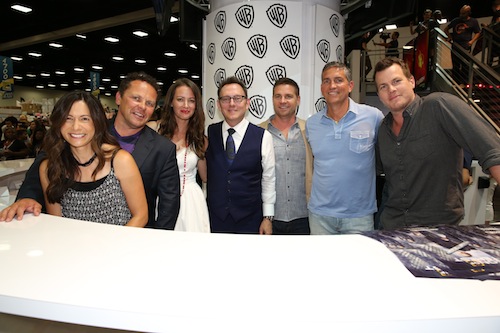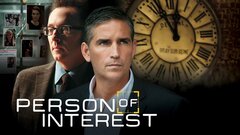‘Person of Interest’ Bosses Reflect on the Drama’s Journey (VIDEO)

After five seasons, Person of Interest is getting ready to say goodbye.
When the series premiered, its focus was more procedural based: Finch (Michael Emerson), a brilliant billionaire, recruited Reese (Jim Caviezel), a former CIA agent, to help him prevent crimes before they occurred. They had a vital help thanks to the help of the Machine, Finch’s creation, which was intended to help prevent the next terrorist attack, but also picked up on the people in jeopardy on a smaller scale.
Initially, their mission was kept quiet, but along the way, more people joined Team Machine—Carter (Taraji P. Henson), an NYPD detective, who initially was trying to track down “the man in the suit,” aka Reese; Fusco (Kevin Chapman), a formerly dirty cop, who was blackmailed into working with Reese and Finch; Root (Amy Acker), a hacker who was drawn to the Machine; and Shaw (Sarah Shahi) a former Intelligence Support Activity agent who used the Machine’s intel at her previous job.
The Machine got a formidable foe of its own in Samaritan, another artificial intelligence; albeit one that was an open system from the start. And as the show embraced its mythology and expanded its world, it evolved into one of the most compelling shows on television.
With the drama about to finish its run, executive producers Jonathan Nolan and Greg Plageman sat down with TVInsider to look back at the journey the series went on. (And check below for an exclusive clip from the series finale.)
Watch a scene from the series finale now!
At what point in the first season did you feel like the pieces of the show clicked together and it was gelling?
Jonathan Nolan: For me, I would say Episode 4.
Greg Plageman: Yeah.
Nolan: Linda Cardellini is the guest star. It’s a standalone episode. At that point, we were trying to get the case of the week format right, and making sure that was heading off in the right direction. But it ended with a note of ambiguity. The network was supportive of it; there were some questions. A very powerful [episode]. [Now-executive producer] Denise Thé wrote it; Denise had worked with Greg before [on Cold Case]. It was kind of a perfect meshing of all of the pieces. It’s a great looking episode, it’s got a great note of ambiguity at the end of it. I just thought that was terrific. And [I thought], “Oh, even if none of the serialized stuff we’re planning works, we can make really, really great standalone episodes. Great actors, cool situations.” There was still something new to mine in the case of the week, detective procedural.
And then Episode 7 for me was where the other part of the show kicked in. Fred Toye directed it, and that last shot of Elias, when you realize who is he, and the camera lifts off, and Nina Simone is playing. Greg and I picked the song—[to Plageman] I think it was your suggestion—and it just realizing, “This isn’t just going to work, it’s going to be fun.”
Plageman: Those were definitely some of the best parts for me, too. Episode 4, the end of that episode, with the ambiguity Jonah mentioned, we were also able to realize what Jim is really fantastic at—he was going to give you that; not only an emotional connection, but an element of menace that was a little bit troubling. This is not a black and white character. This guy, again, the audience is forced to fill in the blanks about what happened after that moment when we fade to black. I knew we had it, because my brother called me, and was like, “That’s it!” Your family members are your harshest critics, and that was one where the hair stood up on the back of his neck, and he said, “You’ve got to stay in that zone.”
Nolan: You realize how much Jim could do, to your point, with a look. That’s a movie star, right? You get in there, you get a close-up, and the episode I think ends on his face.
Plageman: Two-shot, wide, ocean in the back.
Nolan: Yep. There’s that shot of them profiled through each other. And then it cuts out. And I think most of the audience thought their cable went off, because you’re not used to seeing that on a broadcast show. That was the point. The sense of incompleteness, the sense that these characters are not going to be cookie-cutter, they’re not going to be what you’re used to seeing. They’re also not going to be needlessly dark. This is a character—and Jim was perfectly suited to this role—who is searching for something, and is looking for a reason to change and to grow.
Plageman: Another episode, along those lines, that season, to me, it was a seminal episode for me in terms of again, the ambiguity of Jim: “Many Happy Returns.” We went to the Paley Center with that, and I remember watching it in the room, and I remember the flashbacks with Jessica and him in the airport, and realizing, this is a standalone episode, but we can do flashbacks in it that are incredible resonant and revelatory; you’re learning something new about the character that is extremely emotionally resonant to the present day story. And I was in a room full of people watching it, and I was like, “Oh my God, this is what the show can be. Even a good standalone episode can be emotional.”
RELATED: Person of Interest Bosses Talk Creative Freedom in the Final Season
Speaking of the characters’ complexities, the show never romanticized that these were complicated people, who have done occasionally deplorable things—even if it was for “good” reasons. What discussions were there in the writers’ room about showing the humanity in these guys so it’s not totally dark, but also allowing them to do things that can be reprehensible?
Nolan: Separate moments. I remember [writer] David Slack in Episode 5 had a little beat where Reese thanks Finch for the job, and I’m like, “We don’t need this soppy s—!” But it was very effective.
Plageman: [Laughs] I remember that vividly.
Nolan: It works. It totally works
Plageman: There’s another one he had, with Shaw and the little girl, where Shaw is talking about the volume [in relation to her emotions], and I was like, [makes horrified noises]. But it works.
Nolan: It works. And I don’t tend to write from that place. The beautiful thing about collaborating is you get to write with great writers. We got to work with some really great writers on this show, from the beginning; longstanding relationships where you got to see what they could do with these characters. What we could all do with these characters.
In terms of those darker moments, that was what was so inexhaustibly fun about this show. These dark, rich, ambiguous characters, you could constantly carry them to a place you felt like you got into a safe place with these characters, and then they could surprise you again. Reese, over and over and over and over again. Root. All the rest of them. It was really delicious in the beginning of Season 3 with Amy Acker’s character, where she’s in the psychiatric ward. And we’re playing this game, because will the audience come along? We love Amy and this character. We think the audience will come along, but you have to lock her up for a few episodes. And she had this speech to her therapist, where you see she’s talking to her psychiatrist about who he really is. And kind of laying bare what big data would look like, if it’s abused. If it’s accessed in a way that the show fears. If your secrets are laid bare, your secret s—. And Root just lays it out for the guy. It’s a stunning moment. And by the end of it, here’s this transgression for the character, who has been the bad guy for two seasons now. And you’re kind of in, right? You’re like, “F—, I want to see what she can do.” Amy is great fun to work with, but that character is so much fun to write, because she had this transhumanist, kind of eyes on the prize, and the prize is f—ing out there. And so by the time she escaped from the looney bin, and that was great fun—just put Amy in a room, with a great character actor, for three episodes, and by the time she escapes, you’re not going, “Oh, s—, she’s going to come kill Finch,” you’re going, “I don’t know where this is going. And I’m really excited that she’s escaped.”
Plageman: If you think about it, it was a revelation for me on this show is when these characters are introduced, they smack you in the mouth, whether it’s Root, Collier, Control…we don’t tell you their backstory. So when you experience the character, you experience them on a visceral level, present day as a villain. And then you learn Collier’s backstory, and what happened with his brother, and it’s not until later. Control, same thing. And now, all of a sudden, it’s like, “Oh, this completely informs this person’s world view, and I understand them now. And then we kill them.
Nolan: [Laughs] And then we kill them off. Find a great actor–
Plageman: [Laughs] Get them now.
Nolan: One of the ideas with the Machine, and part of the conception of the show: I had been in New York for a while, in 2000, 2001, and I was so fascinated being in a high-rise; you just look out the window and you see story after story. You see the windows in the apartment building across the street turn on and turn off. You see people on the street having a fight, an argument, or falling in love. And everyone out there has a story. Everyone out there has their weight to carry or their history that happens to them who informs the way they are. So you see these characters and work your way back. And in doing so, you see them way the Machine does, because the Machine is privy to all their s—. It’s such an interesting, neutral character.
RELATED: Person of Interest Bosses Tease the ‘Delicious Fun’ Series Finale
What conversations did you have with CBS about the serialized nature of the show, especially in the earlier years when it was in a more high-profile time slot?
Plageman: I think they were respectful. I think their druthers would be that the show didn’t become so opaque that it can’t invite new viewers. And we always tried to walk that line. Even if you dropped in this episode and there are three elements or scenes you have no idea what the f— is going on, and you’re still riveted and you’re still compelled by whatever that number is that week. Sometimes we would dispense with [the format] and do an entirely serialized episode. But it was difficult, because you have so many episodes, and without a streaming option—though there is one now—it’s completely understandable they would want to dial back a little on the serialized stuff.
Nolan: It never really became an argument. It got a little contentious with Samaritan. I think they’re like, “You can have one invisible, all-knowing character, but then two…”
Plageman: And then it stuck around for a whole extra season than they wanted it to.
Nolan: I think they imagined that story would play itself out. But no, in the scope of things, you can’t just invoke it and then throw it away. How can you defeat something that’s all knowing and all seeing?
And how is there another Big Bad after that?
Nolan: Exactly. You kind of paint yourself into a bit of a corner. In a great way; for us, in a great way. But it became something of a conversation. But they were very supportive from the beginning. We never did the cynical bulls— of lying to them about what the show was and sneaking it on to the air. It’s not my style [to lie]. We were upfront from the beginning: this is a show about A.I., this is a show about what’s next, but it lends itself—and the reason we took it to CBS in the first place—is because it’s a great network with a great tradition of compelling procedural storytelling.
And we’re in this evolutionary moment. Bear in mind, for 60 years, that’s been television. With the exception of soap operas, it’s only in the last 15 years that the novel-like show has blown up into now kind of the dominant storytelling, in the same way the multi-cam sitcom vanished for a few years. [People were like,] “Oh, that’s dead.” No. These things never die. And the story of the week, procedural storytelling will never die, never go away. And this idea felt like it leant itself perfectly to that kind of balance.
Plageman: I have this joke running with my assistant, like, “Hey, are you watching Catastrophe?” And she’s like, “No, I have to catch up on that. There’s just too much!” There’s so much content now, that it becomes an obstacle when you’re like, “How many episodes do I have to catch up on?” That becomes its own thing where you’re like, I wish I could just tune in to an episode.
Nolan: You’re going to want to watch an episode of Law & Order. That’s what you’re going to want.
Plageman: Comfort food and Law & Order.
Nolan: For f—ing closure!
Carter and Fusco were around from the start, but originally the series was much more focused on the Reese and Finch partnership. As the series became more of an ensemble, how did that change the stories you were able to tell?
Nolan: So many things along the way have been unexpected and fun. What I’m proud of what Greg and I did with this amazing staff, is a lot of the things we set out to do, we did. We wanted to grow the show into an ensemble for a variety of reasons. Some of them kind of tactical: by your fourth or fifth season, your cast—if you made it a two-hander for 100 episodes, your cast is fried. So, you want to grow the universe for a variety of reasons, and the show leant itself [to that]. Here you’ve got these lonely, odd guys, and slowly the world gets bigger and bigger. And then you get to switch it up a little, write what’s different.
And it’s logarithmic. This is part of directing that Greg and I talked about: a scene with two people is pretty easy to shoot. Coverage is wide shoot, a couple of singles. When you add a third person, it gets that much more complicated. When you get to five people, you’re f—ed. A great piece of advice for a first time director is don’t write scenes for more than three people–then you have to build an eyeline between all of them, and then you get into like 30 shots. But the beauty of that is it applies to relationships with ensembles. So when it’s just Finch and Reese, that’s a cool relationship; that’s the heart of the show. You add a third character, that’s two more relationships—you add an additional character and that’s two more relationships. You add another character, that’s four more relationships. Every character you add isn’t just a character, it’s a relationship. Shaw and Fusco—some of the most fun things to write.
Plageman: Fusco and Root.
Nolan: Right. Root and Reese. It’s so much fun to write all of these relationships between all of these characters. It gives you so much more to explore. Four seasons in, you have that much more to play with those dynamics. It’s a great way of keeping the show fresh for yourself as well.
Plageman: I think, for me, as I was watching [the penultimate episode], I was like, “Do we have too many stories to track? I don’t know…” But never underestimate the audience’s capacity to follow all of that. Having all of those characters allows you to schedule, move them around, get through your day, because otherwise, if you have one guy who needs to be in every scene, you’re going to burn out.
RELATED: Person of Interest Bosses on Greg Plageman's Alternate Reality-Themed Directorial Debut (VIDEO)
When Carter died in Season 3, it was a shocking twist; death wasn’t quite the norm on television, the way it has become now. Looking back at that arc—and specifically at the way the characters were allowed to grieve her in the years since—what stands out to you about how it was handled?
Plageman: There were logistics of Taraji leaving the show, and we had to find a compelling way, and that just worked out. I think what would have felt lame, or a disservice would have been if we didn’t mention her after she’s gone. I think the specter of her still being there is something that still impacted Reese. The episode where Taraji came back, when we explored the whole element of his character, was really powerful. I know a number of people were upset about the loss of her character on the show, but we never forgot about Carter. We never forgot that. And that informed Harold Finch, in terms of almost wishing he never created the Machine, which is what the whole [penultimate episode of the series] was about. As long as you don’t lose the specter of that grief, I think you are honoring that character.
Nolan: We loved working with Taraji. Part of the reason some characters from dramas disappear, never to be seen again is because things are contentious or weird. And Taraji’s a lovely person, and we’ve stayed in touch; we’re so excited for her success. We had always planned to bring her back in a meaningful episode, have emotional closure with Reese, and continue to mention her character, because it wasn’t the characters come and go and we dispose of them—we had always set out to build a consistent universe our characters are living in. And, because you don’t want it to be a cynical party trick of, “Look at what we did now!” I feel like that’s what [TV death] has become a little bit. It’s weird, just in the three years since that season, you’re right, in that moment, it was shocking. I read something that blew my mind of how many characters had been killed off this season…it’s just a bloodbath. I’d love to give us credit for that, but it really started with Ned Stark [on Game of Thrones]. Other places, too. TV shows have often killed off characters: when I was a kid, you watch a show and [a death] happens, and it’s earth-shaking. They were so few and far between. Now, it’s a slightly cynical exercise.
The reason you kill off a character…you’re watching a show, or you’re writing it, or you’re been a part of writing it, or you’ve seen a cut, a cut you’ve seen 40 times by the time you air it. If it still gets you, if it still reaches out, it’s like a drug, that feeling. Every episode we cut like that, you’d be sitting in there with the sound team in playback, and it’s f—ing silent, because what a moment. You live to build these things in these moments. If it’s earned, if it’s just slightly arbitrary…24 killed a lot of people off. And, often did it very effectively. But it often felt it was just a tick, this is the thing we do. We always tried to ride the line where every time you do it, it hits you. If it doesn’t hit you, then you didn’t do it right. But it’s become a bit of an epidemic at this point.
Plageman: You never want your show to feel like it’s comfort food; it’s this immortal family I visit every week, and it’s Season 9 of a show that’s an acronym. But that’s not a reason to kill anyone off, like Jonah said. If you kill someone off and it doesn’t have any emotional impact, you failed. [Laughs] Then it’s gratuitous and silly.
Nolan: Why do humans like stories? We’re f—ing weirdos. It’s a question we explore a little bit in Westworld, kind of explicitly, because that’s what that show is about. I’ve been fascinated since I knew this is what I wanted to do: why do we like this s—? And there’s that sadomasochistic relationship with the audience: “How dare you kill off my favorite character”…but they don’t really want to watch a show where s— doesn’t happen. This is why you have the rise of the massive serialized dramas; because the audience got tired of the f—ing [safe choice]. And of course there’s an overcorrection, and now every drama kills off someone every week. And now it’s like we need to gently nudge it back.
But one of the things I am proud of with the show is that despite being a little, at least in the beginning, fearless with these things, we always tried to keep that balance. It felt wrong but right. Someone defined a good twist as surprising, but inevitable. And that’s a good onscreen [moment]; whether it’s an onscreen death, an affair. We got to visit two of those this year. You want that moment to land. And when it does, it’s like a drug. When you’re writing the show and it still has the ability to reach out and get you like that, not the cheap effect, but a meaningful [one], whatever that drama is we’re all hooked on, that’s when you know it’s right, that you’ve given yourself a good dose of it.
RELATED: Person of Interest‘s Amy Acker on Root’s New Beginning
Did you notice a different in the reaction to Root’s death this season versus Carter’s death in Season 3—either because Root’s came so close to the end or because she is sticking around, in a way?
Nolan: Root’s death had the advantage of being this transcendence story beat—the character is still there. Yeah, it’s still Root. It’s Root expressed by the Machine. That’s one of the ideas expressed by the show. We just weren’t at that point in the story with Taraji’s character, but Taraji’s in there somewhere, too. You had a massive benefit there. I think the Carter thing blindsided people. That wasn’t the intention; it wasn’t a cheap, “ha ha, you didn’t see that coming.” We felt the fans really liked the episodes; they liked the arc around it, because we got a chance. It’s paradoxical, right? As soon as we knew we had an end game laid out for Taraji’s character, for Root’s character, that’s when you get to start doing the most exciting s—. I remember being on set with Taraji and with Amy and with the rest of the cast, and all the actors who are like, “F—, I’m getting killed off…but it’s awesome! And it’s such a cool story we’re telling.” So it was gratifying.
RELATED: Person of Interest Bosses on Finch’s New Mindset, Root’s Evolution, Episode 100’s Losses
Now that the show has reached the end of its journey, what do you hope its legacy will be?
Plageman: I think there was a point where Jonah and I decided that we wanted to protect the show, no matter what happened. You could see the way people’s viewing habits were changing; we never just wanted the show to be a guilty pleasure for people. It was thought-provoking, it was entertaining. Now that the show is available on Netflix, I hope that somewhere down the line, 10 years from now, I hope someone pulls it up the same way my kid just pulled up Arrested Development. You know what I mean? That’s cool.
Nolan: I’d love that.
Plageman: He watched all of Lost, and then he watched all of Breaking Bad, and now he’s making his way through sitcoms. It would be cool if people found the show who maybe didn’t catch it the first time around.
Nolan: I think for me, the personal legacy of the show is the amazing friendships and partnerships—it’s been an extraordinary experience. Not to be too specific about it, but I was always a very big believer in broadcast television. And what we were trying to do—and I hope we succeeded on some level—was make a really great, big tent, broadcast television show that you can watch with slightly older kids, slightly traumatized kids. To reach 16 million-plus people each week, that’s thrilling. And to try and make broadcast TV that has weird ideas in it, and challenging thoughts. Look, it’s a moment right now, working in cable and it’s amazing, and the explosion of storytelling in television is amazing. But I still love that family curl up around the TV, watching CBS on a Tuesday night. And everyone else in the country is watching together. One of the things I genuinely regret about modern television is the non-linear bulls—. Like you said, this is a collective experience, this is watercooler. And that’s been diminished.
Plageman: There’s camps now. It’s weird.
Nolan: Yeah. It’s less important than it used to be. And look, clearly it’s better now than it was back in the days of three channels and you had to watch whatever they wanted to give you. It’s fantastic; the explosion of creativity is amazing. But there’s something pretty magical about millions of people, hopefully, sitting around watching a really compelling, weird story together, and thinking about it and talking about it, and talking afterwards. And making the show, it felt like making a very old-fashioned show. Cyber punk procedural, but with a really old-fashioned [element]—we were not streaming [for the first four seasons].
Plageman: The reason I got into television, to Jonah’s point, was I remember vividly that there were shows I watched with my parents. Moonlighting was one. Cheers, Newhart, I watched these shows with my parents. There’s a watercooler aspect that’s gone. There’s a channel for you, a streaming for you. You can watch on your iPad in your bed, and one for your daughter and the dad. Maybe people get together and they all watch Game of Thrones.
Nolan: There’s still a little bit of appointment television. But that is gone. This was my first TV show, but it feels like in many ways the last of a certain breed of television shows. These things always come back eventually. The hope of making something intelligent, a little dark, weird in a broadcast space that everyone can watch together—even as we made it, it felt like it was the end of an era, a little bit.
Person of Interest, Series Finale, Tuesday, 10/9c, CBS.







